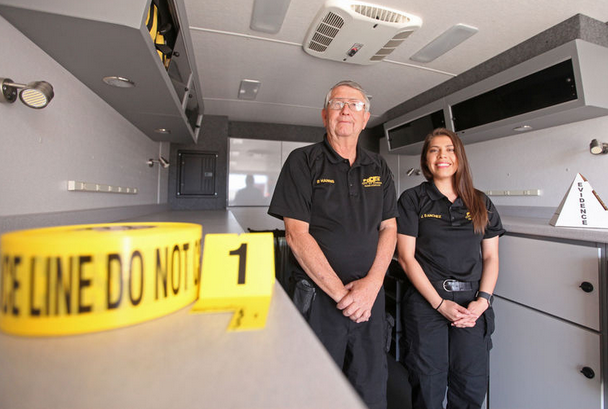The strangest thing she’s had in the evidence vault was a goat’s head.
Enter Article DATE HERE
- Posted on Apr 1, 2018by Ruth Campbell
In the nooks and crannies of the Odessa Police Department, evidence from the variety of cases they tackle is kept in storage. Anything can come in as evidence from beer cans and bats to knives, guns and drugs.
Stephanie Bothwell, Crime Scene Unit supervisor, has been with the police department for 23 years.
Having been interested in her line of work since she watched detective shows in the 1970s, Bothwell supervises the Crime Scene Unit, which has six crime scene technicians who respond to calls for service with police officers. Her unit has been expanded to include three property technicians who take in evidence and store those items for court until those cases are decided.
To date, the strangest thing she’s had in the evidence vault was a goat’s head. It was initially investigated as an animal cruelty case, but it turned out to be someone’s barbecue meat. It was eventually disposed of, she said.
“Another strange thing we’ve had is a full set of dentures where an individual went to the hospital through emergency ambulance as a victim,” Bothwell said. “They were being treated for wounds and at some point decided they were through being treated, so they left the ER and left their dentures there. They never came back to claim them. They still had food in them from the meal. We kept them and endeavored to try and locate them, but they never did come pick up their property, so they got destroyed.”
As long as cases go on, the police have to keep the property.
“When it’s turned in as evidence, we keep it as long as the statute of limitations, or until the case is closed,” Bothwell said.
Bothwell said the police department also receives found property that is not connected to any case such as luggage or a wallet. In those cases, the police just try to find the owner.
Items may be found by someone moving into a new apartment, or if an apartment manager is cleaning up an apartment and finds property. People also have found property in their yards or alleys.
“We have reunited some of that property with owners that call looking for it and … can identify it,” Bothwell said.
If it’s found property, the police keep it for 35 days. If there is an owner, they have another 90 days to pick it up.
Should no owner be found the person who found the property can claim it if it has a fair market value of $500.
“If it’s over $500, we have to put an ad in the paper run it one day and describe it, giving an individual an opportunity to come and identify it and claim it,” Bothwell said.
Illegal property that is found by an officer or a citizen, like a bag of marijuana or an illegal knife, gets put in for destruction.
“We try to do a narcotics destruction once a month. We do that by incinerating, as the need arises. We’ll do metal destructions. An auction is usually held once every three months, just depending on the number of items we have,” Bothwell said.
Lockers of different sizes house handguns or bags of clothing. There is a small drop box where items such as surveillance DVDs and latent print cards can be deposited and a converted mail box slot is available for larger items like a larger bag of marijuana or knives.
A smaller drop box is for biohazardous materials like needles. Bothwell said officers take photos of the items before they put it in the box.
Recently constructed forensic garages are used to collect evidence from vehicles that may have been connected to crimes. There are also storage areas for bicycles, lawn mowers and luggage — things that won’t readily fit inside a locker.
“We’ve got a real good team. … They’re always working on moving stuff out from other older cases, so it’s just like a big cycle. It’s nice when you get to have a big purge and get things moved out. They’ve got a good plan. They’re working it,” Bothwell said.
Ector County District Attorney Bobby Bland said it’s vital to have a good property room to maintain the integrity of certain items. Because evidence was properly kept, he said, the 1990 stabbing death of Virginia Jean Washelesky was solved.
Johnny Lee Wells is currently in the state prison serving a life sentence for capital murder, a 15-year sentence for burglary of a habitation and 30 years for aggravating kidnapping.
Bland said the police were able to get DNA from items that were kept in the evidence room years later, enter it into the CODIS (Combined DNA Index System) and match it with a prison inmate.
Some of the blood and DNA was gathered from items in the victim’s purse, Bland said.
“We were able to prosecute that person and now that person is serving life in prison,” Bland said. “Justice was served, even if it was years later.”
“Without that, these cold cases couldn’t be solved because of the job they did in collecting and maintaining the evidence we didn’t have any problem getting that evidence in trial, even though over a dozen years after it happened.



